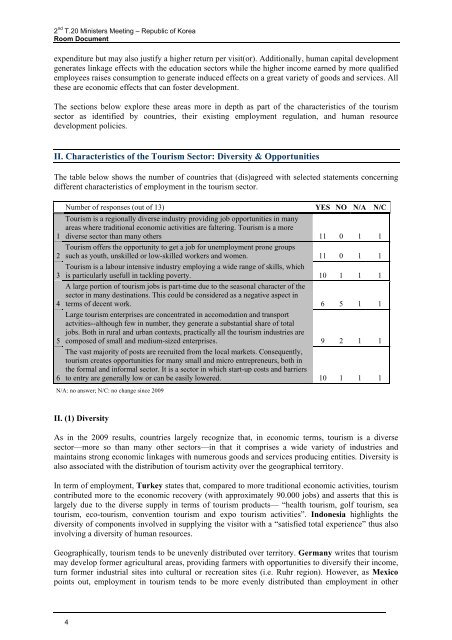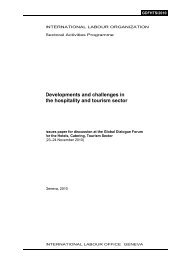Questionnaire on Tourism and Employment: Overview of Results
Questionnaire on Tourism and Employment: Overview of Results
Questionnaire on Tourism and Employment: Overview of Results
Create successful ePaper yourself
Turn your PDF publications into a flip-book with our unique Google optimized e-Paper software.
2 nd T.20 Ministers Meeting – Republic <strong>of</strong> Korea<br />
Room Document<br />
expenditure but may also justify a higher return per visit(or). Additi<strong>on</strong>ally, human capital development<br />
generates linkage effects with the educati<strong>on</strong> sectors while the higher income earned by more qualified<br />
employees raises c<strong>on</strong>sumpti<strong>on</strong> to generate induced effects <strong>on</strong> a great variety <strong>of</strong> goods <strong>and</strong> services. All<br />
these are ec<strong>on</strong>omic effects that can foster development.<br />
The secti<strong>on</strong>s below explore these areas more in depth as part <strong>of</strong> the characteristics <strong>of</strong> the tourism<br />
sector as identified by countries, their existing employment regulati<strong>on</strong>, <strong>and</strong> human resource<br />
development policies.<br />
II. Characteristics <strong>of</strong> the <strong>Tourism</strong> Sector: Diversity & Opportunities<br />
The table below shows the number <strong>of</strong> countries that (dis)agreed with selected statements c<strong>on</strong>cerning<br />
different characteristics <strong>of</strong> employment in the tourism sector.<br />
Number <strong>of</strong> resp<strong>on</strong>ses (out <strong>of</strong> 13)<br />
<strong>Tourism</strong> is a regi<strong>on</strong>ally diverse industry providing job opportunities in many<br />
areas where traditi<strong>on</strong>al ec<strong>on</strong>omic activities are faltering. <strong>Tourism</strong> is a more<br />
YES NO N/A N/C<br />
1 diverse sector than many others<br />
<strong>Tourism</strong> <strong>of</strong>fers the opportunity to get a job for unemployment pr<strong>on</strong>e groups<br />
11 0 1 1<br />
2 such as youth, unskilled or low-skilled workers <strong>and</strong> women.<br />
<strong>Tourism</strong> is a labour intensive industry employing a wide range <strong>of</strong> skills, which<br />
11 0 1 1<br />
3 is particularly usefull in tackling poverty.<br />
A large porti<strong>on</strong> <strong>of</strong> tourism jobs is part-time due to the seas<strong>on</strong>al character <strong>of</strong> the<br />
sector in many destinati<strong>on</strong>s. This could be c<strong>on</strong>sidered as a negative aspect in<br />
10 1 1 1<br />
4 terms <strong>of</strong> decent work.<br />
Large tourism enterprises are c<strong>on</strong>centrated in accomodati<strong>on</strong> <strong>and</strong> transport<br />
actvities--although few in number, they generate a substantial share <strong>of</strong> total<br />
jobs. Both in rural <strong>and</strong> urban c<strong>on</strong>texts, practically all the tourism industries are<br />
6 5 1 1<br />
5 composed <strong>of</strong> small <strong>and</strong> medium-sized enterprises.<br />
The vast majority <strong>of</strong> posts are recruited from the local markets. C<strong>on</strong>sequently,<br />
tourism creates opportunities for many small <strong>and</strong> micro entrepreneurs, both in<br />
the formal <strong>and</strong> informal sector. It is a sector in which start-up costs <strong>and</strong> barriers<br />
9 2 1 1<br />
6 to entry are generally low or can be easily lowered. 10 1 1 1<br />
N/A: no answer; N/C: no change since 2009<br />
II. (1) Diversity<br />
As in the 2009 results, countries largely recognize that, in ec<strong>on</strong>omic terms, tourism is a diverse<br />
sector—more so than many other sectors—in that it comprises a wide variety <strong>of</strong> industries <strong>and</strong><br />
maintains str<strong>on</strong>g ec<strong>on</strong>omic linkages with numerous goods <strong>and</strong> services producing entities. Diversity is<br />
also associated with the distributi<strong>on</strong> <strong>of</strong> tourism activity over the geographical territory.<br />
In term <strong>of</strong> employment, Turkey states that, compared to more traditi<strong>on</strong>al ec<strong>on</strong>omic activities, tourism<br />
c<strong>on</strong>tributed more to the ec<strong>on</strong>omic recovery (with approximately 90.000 jobs) <strong>and</strong> asserts that this is<br />
largely due to the diverse supply in terms <strong>of</strong> tourism products— “health tourism, golf tourism, sea<br />
tourism, eco-tourism, c<strong>on</strong>venti<strong>on</strong> tourism <strong>and</strong> expo tourism activities”. Ind<strong>on</strong>esia highlights the<br />
diversity <strong>of</strong> comp<strong>on</strong>ents involved in supplying the visitor with a “satisfied total experience” thus also<br />
involving a diversity <strong>of</strong> human resources.<br />
Geographically, tourism tends to be unevenly distributed over territory. Germany writes that tourism<br />
may develop former agricultural areas, providing farmers with opportunities to diversify their income,<br />
turn former industrial sites into cultural or recreati<strong>on</strong> sites (i.e. Ruhr regi<strong>on</strong>). However, as Mexico<br />
points out, employment in tourism tends to be more evenly distributed than employment in other<br />
4



